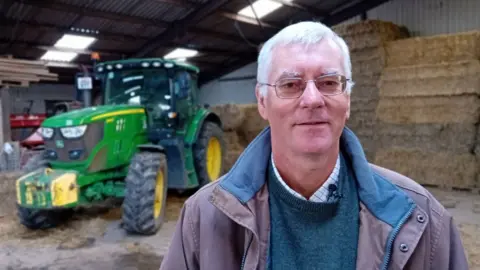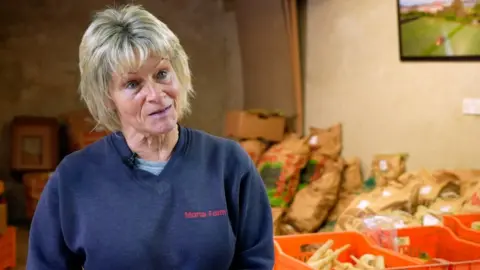Storm Ciarán: Jersey's agriculture industry hit hard
 BBC
BBC"I've never seen anything like it."
Philip Le Maistre, the chair of Jersey's Milk Marketing Board, is reflecting on the impact on the island's farming industry of Storm Ciarán.
More than 150 residents were displaced and there was major damage to homes, organisations and schools.
The storm also brought a "significant tornado" to eastern parts of the biggest Channel Island when it hit on 2 November.
But, while most islanders waited indoors for the strong winds to drop, farmers had no choice but to carry on.
"We had to go and collect the milk, so the milk lorry had to get to every farm on Thursday morning and even the managing director was there with a chainsaw in the lorry cutting trees to make a path through," says Mr Le Maistre.
"We've got about half a dozen fields. We went around everywhere, all the fencing posts were down.
"Fortunately all the animals were huddled in the corner and they didn't get out."
 Mark Laurence
Mark LaurenceThe storm also disrupted Jersey's fishing fleet, which has been unable to go out to sea for more than a week.
"Two boats have snuck out of the harbour to have a look to see if it's fishable," says Gabrielle Mason from Jade-S Fisheries.
"But the honest truth is it's still like a washing machine. The whole sea is going to be churning and it's not that safe to be going out right now."
'Start investing now'
Storm Ciarán is just the latest challenge faced by the island's two oldest industries, which in recent years have had to respond to issues caused by Brexit, the coronavirus pandemic, climate change and the cost of living crisis.
And despite reductions in the number of active dairy herds, arable farms and fishing boats, government subsidies for farming and fishing have remained lower than in both the UK and the EU.
Those working in the sectors now hope extra funding recently approved by Jersey's politicians will help to turn the tide.
"It's going to make a real difference," said Mr Le Maistre, who was particularly enthused by a government pledge to add £10m to a fund that provides capital loans to farmers.
"That to me is going to be a huge help for those who really want to invest in their businesses, and if we're really serious about farming having a long-term future it's critical people start investing now."
The vote will also mean taxpayer support for farming and fishing will increase to at least £6.7m in 2024, before increasing in subsequent years.
In the north-western parish of St Ouen, vegetable farmer Christine Hellio hopes the additional funding will help to cover her wage, fuel and rent costs.

But she does not believe the money will go far enough.
"Everybody might say that their food bill has gone up. Well I can guarantee you that this has not been passed down to the farmer," she says.
"We definitely need the funding. I think it will only be a matter of time as to whether the States has decided to do something a little too late."
At the Victoria Pier, Ms Mason is hopeful the new subsidies will provide a much-needed confidence boost for the battered fishing industry.
"It's heart-breaking to say, but the morale here is at an all-time low. I don't think it's ever perhaps been this low," she says.
"People around the harbours don't have that positive future outlook for the industry as a whole.
"Certainly lots of people are talking about leaving."
'Work even harder'
At the sold-out annual Farming Conference on Friday, Minister for Sustainable Economic Development Deputy Kirsten Morel praised the "resilience and innovation" of the agricultural industry.
He also said it was important to "repay" the government investment by making the industry "work even harder".
"That means pushing into new markets and not just relying on the UK.
"It means truly exploring agri-tourism, to provide greater revenue stability and exploring new ways of working together so that the sum of our parts as a sector is much greater than our individual contributions."
Across the day, people at the conference reflected on the future of farming, including the need to promote local produce.
Eamon Fenlon, managing director of Jersey Dairy said: "I think last week definitely convinced people that having local products is important and hopefully they'll remember that when they go to the supermarket… and choose their local product in order to keep the farmers in business, because without them we don't survive."

Follow BBC Jersey on Twitter and Facebook. Send your story ideas to channel.islands@bbc.co.uk.